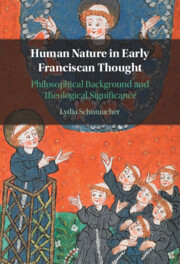Book contents
- Human Nature in Early Franciscan Thought
- Human Nature in Early Franciscan Thought
- Copyright page
- Dedication
- Contents
- Acknowledgements
- Key to Summa Halensis Citations
- List of Abbreviations
- Introduction
- 1 The Philosophy of the Soul c.1150–1215
- 2 Theological Background
- 3 The Soul and the Body
- 4 The Powers of the Soul
- 5 Cognitive Powers
- 6 Cognitive Powers in John of La Rochelle’s Summa de anima
- 7 The Reception of Averroes in Early Scholasticism
- 8 Cognitive Powers
- 9 The Affections
- 10 Free Choice
- 11 Angels
- 12 Conclusion
- Bibliography
- Index
6 - Cognitive Powers in John of La Rochelle’s Summa de anima
Published online by Cambridge University Press: 27 January 2023
- Human Nature in Early Franciscan Thought
- Human Nature in Early Franciscan Thought
- Copyright page
- Dedication
- Contents
- Acknowledgements
- Key to Summa Halensis Citations
- List of Abbreviations
- Introduction
- 1 The Philosophy of the Soul c.1150–1215
- 2 Theological Background
- 3 The Soul and the Body
- 4 The Powers of the Soul
- 5 Cognitive Powers
- 6 Cognitive Powers in John of La Rochelle’s Summa de anima
- 7 The Reception of Averroes in Early Scholasticism
- 8 Cognitive Powers
- 9 The Affections
- 10 Free Choice
- 11 Angels
- 12 Conclusion
- Bibliography
- Index
Summary
This chapter illustrates how the psychology of the Tractatus is incorporated into the Summa de anima and builds on the exposition of the Tractatus provided in Chapter 5 with a view to explaining how precisely John of La Rochelle conceived the operation of the senses and the human mind. The chapter argues that John used Avicenna to endorse an ‘active’ theory of cognition in which innate categories of the mind, later known as transcendentals, play a role in shaping human understanding of the senses, which nonetheless provide crucial material to be rendered intelligible.
- Type
- Chapter
- Information
- Human Nature in Early Franciscan ThoughtPhilosophical Background and Theological Significance, pp. 166 - 181Publisher: Cambridge University PressPrint publication year: 2023

